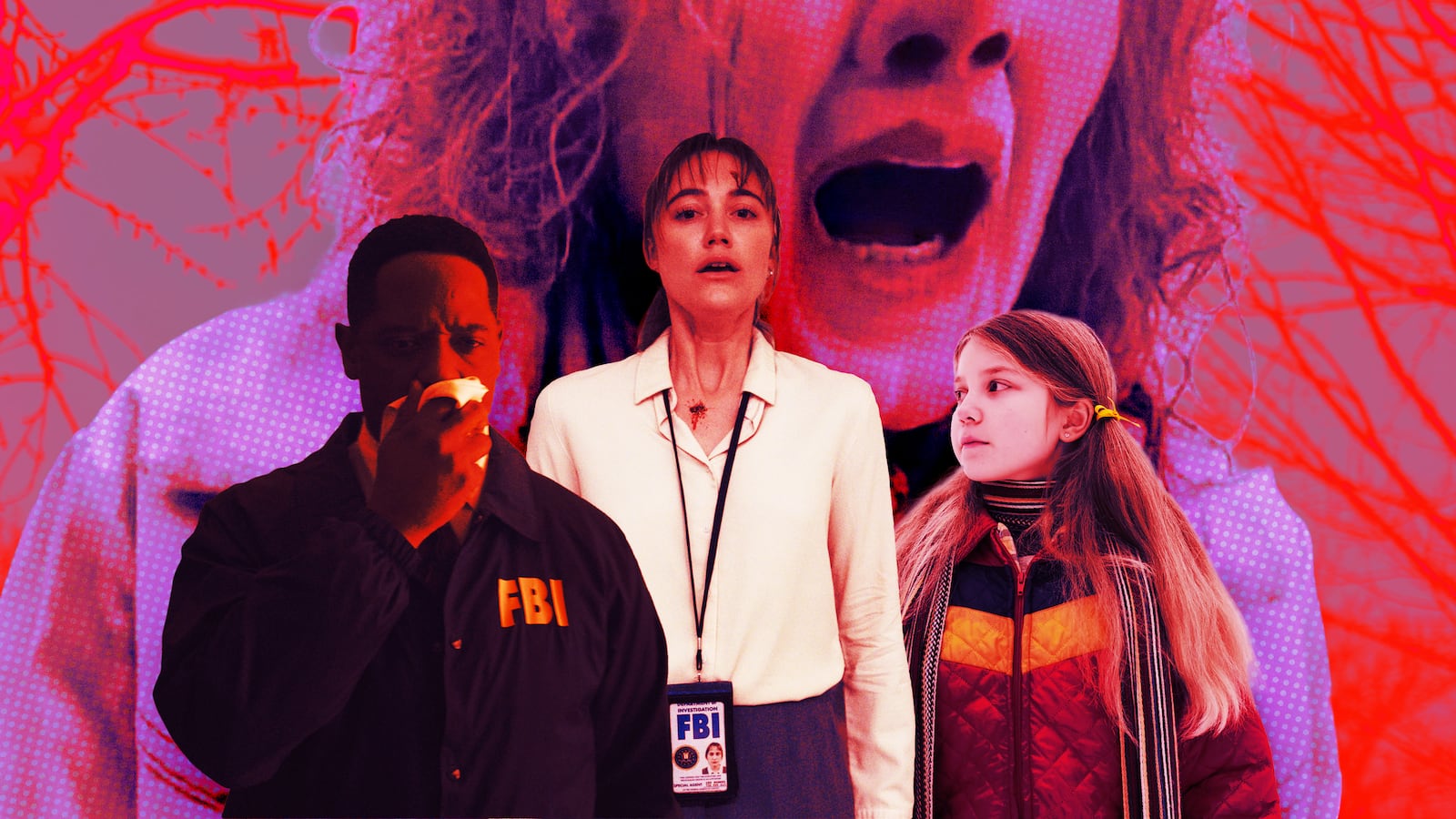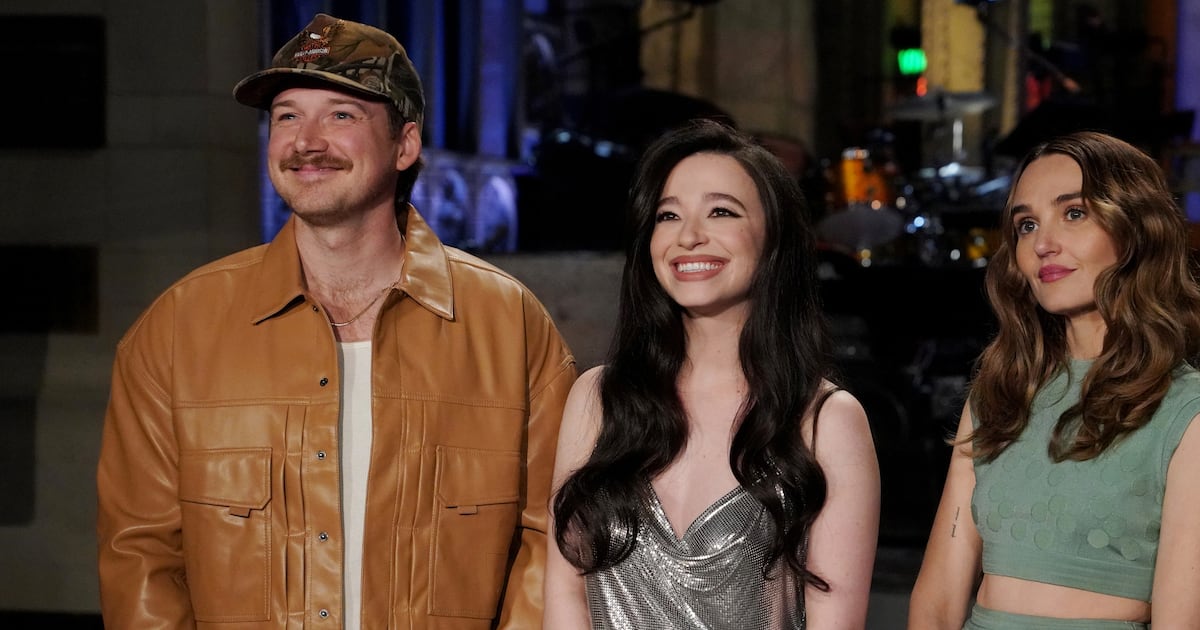The marketing behind Longlegs was so effective—cryptic, intriguing, spooky as all get-out—that the film probably could have turned a profit if it starred two pastrami sandwiches. The fact that it stands to do considerably more than turn a profit (a feat it achieved after its first weekend) is a testament not only to Osgood Perkins’ creative vision, but to the actors who carry it out.
In a write-up on Miles Davis’ On the Corner, Pitchfork’s Jonathan Zwickel remarked that the album’s sound was “so unified and driven even the dude playing sleigh bells rocks as hard and heavy as Miles.” That kind of synergy is the mark of a great jazz album, and it’s the mark of a great cast, too. In a movie like Longlegs, there are no superfluous roles: Whether they’re the main character, a one-scene bit of comic relief, or just a voice recording, every character has a purpose, and every actor has a series of targets to hit. The following seven actors all hit bullseye.
(Honorable mentions go to Bill Clinton and Richard Nixon, who made their presence known in the film through several incredibly conspicuous shots of their portraits. I firmly believe every movie should have giant pictures of their era-appropriate president displayed on the wall so we know where we stand.)
7. Shafin Karim as “Clinical Doctor”
Karim gives arguably the finest one-scene performance by a somewhat fruity man positioned behind a desk since Alan Cumming in Eyes Wide Shut.
The good doctor appears roughly halfway through the film as FBI agents Harker and Carter arrive at a mental institution in an attempt to contact Carrie Anne Camera, the sole survivor of the mysterious serial killer Longlegs. Despite the gravity of the situation, however, the doctor is remarkably unbothered: Karim plays him with the appealingly messy insouciance of a Starbucks barista who isn’t getting paid enough to care, which is somehow delightful even though his job is so high-stakes. (When asked if Carrie Anne’s previous visitor, Longlegs, provided ID, he dryly responds, “That would probably be a good idea, but no.”)

Maika Monroe.
NEONLonglegs uses its comic relief sparingly, and the scene could have been jarring if Karim didn’t understand the assignment so thoroughly.
6. Bea Perkins as “Teenage Clerk”
The star of another comic relief scene (this really is a scary movie, we promise you), Oz Perkins’ daughter is delightful as a decorated veteran of the IDGAF Wars. The bored young cashier at her father’s hardware store is the first person—aside from a younger version of the protagonist in a flashback—who we see interact with Longlegs himself, and she is decidedly unimpressed.
Standing there looking like a melted wax statue of Marc Bolan, Longlegs does a bizarre dance in front of her, covering his eyes with his hands and cooing “cuckoo!” like, well, a creepy-ass serial killer played by Nicolas Cage. Her response? She stares blankly, flatly tells him she has no idea what he’s doing, then calls to the back of the shop. “Dad, that gross old guy’s back again!” It goes to show that no force in Heaven or Hell can withstand the withering glare of a mean teenage girl.

5. Kiernan Shipka as “Carrie Anne Camera”
The erstwhile Sally Draper (if you’re a millennial)/Sabrina Spellman (if you’re a zoomer) has some history with Oz Perkins: She starred alongside Emma Roberts in his debut, The Blackcoat’s Daughter. So it’s only right that she turns up for a scene in the middle of Perkins’ mainstream breakthrough to put a different kind of spell on the audience.
As the recently un-catatonic Carrie Anne Camera, she recounts the events of her family’s murder to Agent Harker and details Longlegs’ recent visit. But what she says is almost secondary to how she says it: Over the course of a monologue, she turns from mumbling and recalcitrant to dreamy, almost wistful. She narrates the grisly murders carried out by her father, along with her newfound willingness to kill and die for Longlegs, as though she were the protagonist of a Terrence Malick film. We keep waiting for her to snap and lunge at Harker with a howl, but she never does. She just gives herself over to the Satanic killer, “sweeter’n peaches.”
4. Alicia Witt as “Ruth Harker”
We first hear Ruth Harker, the mother of the haunted protagonist Lee, over the phone. Two things become clear immediately: The relationship between mother and daughter is deeply strained, and there is something Ruth can’t quite bring herself to say. It tugs at the edges of her small, tired voice, manifesting itself only in benign questions about work and saying one’s prayers.
Alicia Witt plays Ruth, living in her white clapboard house with only daytime television for company, as someone whose psyche has fractured beneath the weight of a terrible burden: When she’s in the same room as her daughter, it’s as though she’s on the other end of a Zoom call. To the extent that the film’s third act works, it works because of the way Witt balances a sympathetic maternal protectiveness with the unspeakable toll it takes, both on herself and the world around her.
3. Blair Underwood as “Agent Carter”
Blair Underwood is one of those actors you’re always happy to see. Whenever he turns up on one of the many interchangeable procedural shows on network television, it’s like running into an old college friend at an otherwise boring party.
As Agent Carter, Lee Harker’s superior/partner/father figure, he fleshes out what could have been a dry, functional character with personality and verve. Unlike Harker, a tightly-wound, socially inept workaholic, Carter carries himself as someone who’s had a long, interesting life. Weary yet good-humored, authoritative yet approachable, he’s exactly the kind of grounding influence someone like Harker needs—which only makes their eventual, inexorable break that much worse.

Nicolas Cage as Longlegs.
Longlegs production still.2. Nicolas Cage as “Longlegs/Dale Ferdinand Cobble”
Can you believe we used to argue whether Nicolas Cage was a good actor? There was a whole joke on Community about it. The court of public opinion seems to have settled on “yes” at this point, and rightfully so.
While he’s perfectly capable of winning over critics and award bodies (Pig, Leaving Las Vegas), he understands that the generally accepted idea of “good acting”—subtle naturalism, tasteful choices, show-all-the-work fussiness—is stifling for actors, directors, and audiences alike. If you ask him to play a serial killer, he isn’t going to give you a warmed-over Hannibal Lecter pastiche. He isn’t going to pore over interviews with Ted Bundy or Edmund Kemper. He’s going to give you something nobody else on Earth will give you.
As Longlegs, a demented doll maker in league with satanic forces, Cage is inhuman in the truest sense. You can’t imagine him being born. You can vaguely picture him growing on a basement wall like some terrible fungus. He speaks in a weird, warbly falsetto that sounds like a cross between Tiny Tim and a strangled goose. He moves like a puppet, fluttering his hands and flopping his head. Occasionally, he bursts into song: “Let me in nooooow! Or I will come baaaaack! Not oooonce! Not twiiiiiice! But as many times as I liiiiiike!” When he delivers a line like “ohhh, there she is!”, he sounds simultaneously happy, agonized, terrified, and horny.
Yet for all the strangeness, every choice he makes feels not only organic but somehow inevitable. Those who see Cage as a meme first and an actor second may laugh, but Longlegs doesn’t cast its sinister spell without Cage’s spark of black magic.
1. Maika Monroe as “Agent Lee Harker”
Lee Harker is good at her job. Lee Harker is, in fact, supernaturally good at her job. She combines an obsessive work ethic with a sense of intuition that can be more accurately described as “psychic”. And yet, from her very first scene, Lee Harker is barely holding it together.
We understand that her current path is leading her towards a crisis at best and annihilation at worst. This is a very difficult balance to strike as an actor, especially as a lead. If the performance is too steely, it becomes difficult to believe that Lee would come apart at the seams; if the performance is too fragile, we’re left to wonder how she made it through training.
Maika Monroe strikes that balance before she says a single word. Just from the way Lee carries herself, we know who she is. Her jaw is locked in a headache-inducing perma-clench; her eyes straddle the border between “observant” and “vigilant”; she frowns like smiling would cause her physical pain. When she does speak, she is intelligent and thoughtful, but speaks in a caffeinated, tightly-wound monotone.
She plays Lee’s social awkwardness for some of the movie’s biggest laughs—when Carter tells her to meet his family, she asks “do I have to?” not with sullen resentment but with genuine trepidation - but never lets us forget the character’s pain for even a moment. Longlegs has been compared often enough to The Silence of the Lambs, but Monroe gives a truly Foster-worthy performance—and should be recognized as such.






